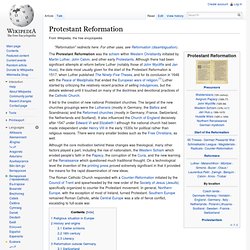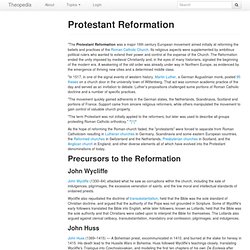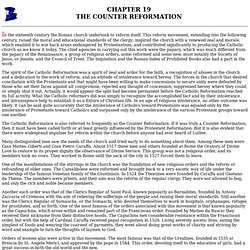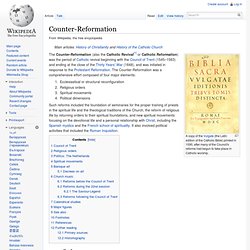

Protestant Reformation. Although the core motivation behind these changes was theological, many other factors played a part, including the rise of nationalism, the Western Schism which eroded people's faith in the Papacy, the corruption of the Curia, and the new learning of the Renaissance which questioned much traditional thought.

On a technological level the invention of the printing press proved extremely significant in that it provided the means for the rapid dissemination of new ideas. The Roman Catholic Church responded with a Counter-Reformation initiated by the Council of Trent and spearheaded by the new order of the Society of Jesus (Jesuits) specifically organized to counter the Protestant movement. In general, Northern Europe, with the exception of most of Ireland, turned Protestant. Southern Europe remained Roman Catholic, while Central Europe was a site of fierce conflict, escalating to full-scale war. Religious situation in Europe[edit] History and origins[edit] Earlier schisms[edit] Literacy[edit] Protestant Reformation. "The Protestant Reformation was a major 16th century European movement aimed initially at reforming the beliefs and practices of the Roman Catholic Church.

Its religious aspects were supplemented by ambitious political rulers who wanted to extend their power and control at the expense of the Church. The Reformation ended the unity imposed by medieval Christianity and, in the eyes of many historians, signaled the beginning of the modern era. A weakening of the old order was already under way in Northern Europe, as evidenced by the emergence of thriving new cities and a determined middle class. "In 1517, in one of the signal events of western history, Martin Luther, a German Augustinian monk, posted 95 theses on a church door in the university town of Wittenberg. That act was common academic practice of the day and served as an invitation to debate. "The movement quickly gained adherents in the German states, the Netherlands, Scandinavia, Scotland and portions of France. John Wycliffe. Reformation- Definition. THE COUNTER REFORMATION. In the sixteenth century the Roman church undertook to reform itself.

This reform movement, extending into the following century, raised the moral and educational standards of the clergy; inspired the church with a renewed zeal and morale, which enabled it to win back areas endangered by Protestantism; and contributed significantly to producing the Catholic church as we know it today. The chief agencies in carrying out this work were the papacy, which was much different from the papacy of the Renaissance; a group of religious orders, some reformed and some new, most notably the Society of Jesus, or Jesuits; and the Council of Trent. The Inquisition and the Roman Index of Prohibited Books also had a part in the work. The spirit of the Catholic Reformation was a spirit of zeal and ardor for the faith, a recognition of abuses in the church and a dedication to the work of reform, and an attitude of intolerance toward heresy. Orders of women also were active in this movement. Counter Reformation- Definition.
Counter-Reformation. A copy of the Vulgate (the Latin edition of the Catholic Bible) printed in 1590, after many of the Council's reforms had begun to take place in Catholic worship.

The Counter-Reformation (also the Catholic Revival[1] or Catholic Reformation) was the period of Catholic revival beginning with the Council of Trent (1545–1563) and ending at the close of the Thirty Years' War (1648), and was initiated in response to the Protestant Reformation. The Counter-Reformation was a comprehensive effort composed of four major elements: Ecclesiastical or structural reconfigurationReligious ordersSpiritual movementsPolitical dimensions Council of Trent[edit] A session of the Council of Trent, from an engraving.
Pope Paul III (1534–1549) initiated the Council of Trent (1545–1563), a commission of cardinals tasked with institutional reform, addressing contentious issues such as corrupt bishops and priests, indulgences, and other financial abuses. Religious orders[edit] Politics: The Netherlands[edit]